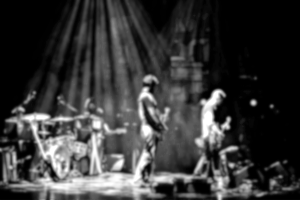
Thu May 15 2025
7:30 PM
£22.00 - £24.15
Ages 14+
Share With Friends
When Sam Amidon flew to Los Angeles late in the winter of 2024 to collaborate with Sam Gendel, he had a deceptively complex plan for their session: That is, he had no real plan at all. Amidon and Gendel had long been two members of a mutual admiration society. When Amidon first saw Gendel play at his now-fabled residency at the Hollywood Italian restaurant Pace years earlier, he was wowed by Gendel’s open-ended enthusiasm and stylistic vim, plus charmed by his invitation to sit in on violin, though he didn’t know much about making “jazz.” Gendel, too, had been an ardent fan of Amidon’s voice and flexibility since seeing him on YouTube nearly two decades ago. Gendel even joined Amidon and the great Milford Graves for the 12-minute finale of 2017’s The Following Mountain. But what, exactly, were the New England folk musician now living in England and the pedal-hopping polyglot saxophonist going to do for the better part of a week in Gendel’s Venice home, in his ad hoc dining room studio? Neither exactly knew.
Amidon offered up two ideas. First, they could simply play, pursuing whatever ideas felt good as they jammed. Or, perhaps, they could tinker with a batch of interpretations Amidon had been building, a loose set of somewhat familiar tunes—Yoko Ono’s “Ask the Elephant,” Lou Reed’s “Big Sky,” the rapturous hymn “Old Churchyard,” the standard English shanty “Golden Willow Tree.” Gendel’s eyes and imagination lit up with the latter idea, or at the chance to help Amidon in his decades-long quest to recontextualize what it means to sing a folk song or make folk music. When Amidon left Los Angeles just days later, the bulk of Salt River—his Gendel-produced debut for River Lea Recordings / Rough Trade and a radical reintroduction to the possibilities of Sam Amidon’s music—was done.
Since his earliest days of releasing records, Amidon has been interested in the idea of submission, of working closely with collaborators who could take his skills as an interpreter, singer, guitarist, and fiddler somewhere unexpected. Thomas Bartlett and Nico Muhly once helped lead him to those unknowns, as did producer and multi-instrumentalist Shahzad Ismaily. His confidence as a bandleader and arranger have, of course, increased over decades on stages and in studios; his self-titled 2020 album, full of idiosyncratic and imaginative new renditions of sometimes-ancient songs, was the result of a touring unit, working as one. The submission had been subsumed. But he longed to be a beginner again, to submit to a process that was unfamiliar and even exotic with someone he knew he could trust—namely, someone like Gendel, whose understanding of how electronics might be applied to material often rendered with acoustic instruments intrigued Amidon. They invited drummer Philippe Melanson, a frequent collaborator of both, to join.
£22.00 - £24.15 Ages 14+
When Sam Amidon flew to Los Angeles late in the winter of 2024 to collaborate with Sam Gendel, he had a deceptively complex plan for their session: That is, he had no real plan at all. Amidon and Gendel had long been two members of a mutual admiration society. When Amidon first saw Gendel play at his now-fabled residency at the Hollywood Italian restaurant Pace years earlier, he was wowed by Gendel’s open-ended enthusiasm and stylistic vim, plus charmed by his invitation to sit in on violin, though he didn’t know much about making “jazz.” Gendel, too, had been an ardent fan of Amidon’s voice and flexibility since seeing him on YouTube nearly two decades ago. Gendel even joined Amidon and the great Milford Graves for the 12-minute finale of 2017’s The Following Mountain. But what, exactly, were the New England folk musician now living in England and the pedal-hopping polyglot saxophonist going to do for the better part of a week in Gendel’s Venice home, in his ad hoc dining room studio? Neither exactly knew.
Amidon offered up two ideas. First, they could simply play, pursuing whatever ideas felt good as they jammed. Or, perhaps, they could tinker with a batch of interpretations Amidon had been building, a loose set of somewhat familiar tunes—Yoko Ono’s “Ask the Elephant,” Lou Reed’s “Big Sky,” the rapturous hymn “Old Churchyard,” the standard English shanty “Golden Willow Tree.” Gendel’s eyes and imagination lit up with the latter idea, or at the chance to help Amidon in his decades-long quest to recontextualize what it means to sing a folk song or make folk music. When Amidon left Los Angeles just days later, the bulk of Salt River—his Gendel-produced debut for River Lea Recordings / Rough Trade and a radical reintroduction to the possibilities of Sam Amidon’s music—was done.
Since his earliest days of releasing records, Amidon has been interested in the idea of submission, of working closely with collaborators who could take his skills as an interpreter, singer, guitarist, and fiddler somewhere unexpected. Thomas Bartlett and Nico Muhly once helped lead him to those unknowns, as did producer and multi-instrumentalist Shahzad Ismaily. His confidence as a bandleader and arranger have, of course, increased over decades on stages and in studios; his self-titled 2020 album, full of idiosyncratic and imaginative new renditions of sometimes-ancient songs, was the result of a touring unit, working as one. The submission had been subsumed. But he longed to be a beginner again, to submit to a process that was unfamiliar and even exotic with someone he knew he could trust—namely, someone like Gendel, whose understanding of how electronics might be applied to material often rendered with acoustic instruments intrigued Amidon. They invited drummer Philippe Melanson, a frequent collaborator of both, to join.



Share With Friends